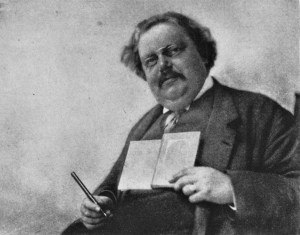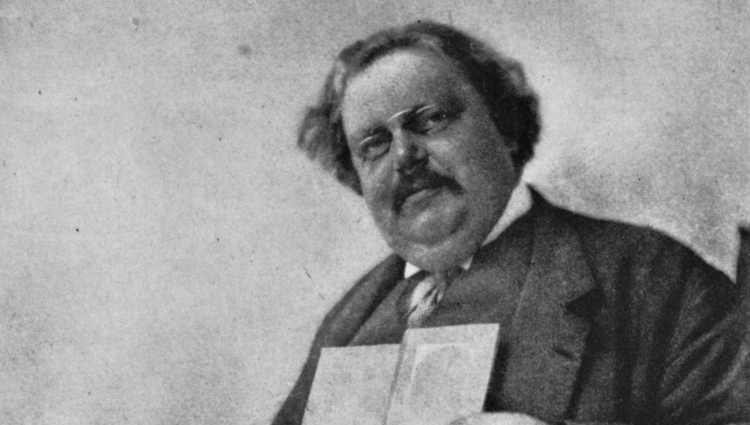“Orthodoxy” ends with Chesterton delving deep into the divine comedy at the heart of all things. If angels can fly because they take themselves lightly, does God take Himself lightly?
 In a recent essay, I wrote about truth and masks in the world and works of Oscar Wilde. As a follow-up, I’d like to focus on truth and masks in the work of Chesterton, especially as they might be seen as a response to the world of masks that Wilde presents.
In a recent essay, I wrote about truth and masks in the world and works of Oscar Wilde. As a follow-up, I’d like to focus on truth and masks in the work of Chesterton, especially as they might be seen as a response to the world of masks that Wilde presents.
Chesterton’s novel, The Man Who was Thursday, can and should be seen as a response and even as a riposte to Oscar Wilde. The novel’s inspirational source was Chesterton’s own experience of the Decadence of the early-1890s, when he was an art student caught up in the iconoclastic culture of Wildean aestheticism at a time when Wilde’s influence was in the ascendant. In his autobiography, Chesterton wrote that “the whole story is a nightmare of things, not as they are, but as they seemed to the young half-pessimist of the ’90s….”
It is, however, important to distinguish between this inspirational source for the novel and Chesterton’s aspirational intentions when he wrote it. Even though The Man Who was Thursday was inspired by the confusion of the fin de siècle it aspires to dispel and disperse the clouds of despondency with the piercing light of Christian clarity and charity. It cannot be stressed enough that this critical distance between the inspirational and aspirational aspects of the novel is crucial to our understanding of it. Thursday was written at around the same time that Chesterton was also writing Orthodoxy, his masterpiece of Christian apologetics, both books being published in 1908, and it is perilous to our understanding of the former book if we fail to read it in the light of the latter.
Having exposed the nihilism of Nietzscheanism and other egocentric philosophies in a chapter of Orthodoxy entitled “The Suicide of Thought”, Chesterton countered in the following chapter, “The Ethics of Elfland”, that the greatest truths can be found in the realm of fairy stories. “Fairyland is nothing but the sunny country of common sense,” he wrote. “It is not earth that judges heaven, but heaven that judges the earth; so for me at least it was not earth that criticized elfland, but elfland that criticized the earth.” In other words, fairy stories should be seen as masques in which the masks of vice or imperfection are removed and judged from the perspective of virtue or perfection. As heaven (the perfection of virtue) judges the earth (the imperfection due to vice); so fairytales (stories which show us how things should and shouldn’t be) judge the way things are in our world from the perspective of the way they ought to be.
In order to see the truths that fairytales show us, we need to be filled with gratitude and able to see reality with eyes wide open with wonder. Such wonder was the fruit of the humility which Wilde and the decadent advocates of pride lacked:
Men (I felt) might fast forty days for the sake of hearing a blackbird sing. Men might go through fire to find a cowslip. Yet these lovers of beauty could not even keep sober for the blackbird. They would not go through common Christian marriage by way of recompense to the cowslip. Surely one might pay for extraordinary joy in ordinary morals. Oscar Wilde said that sunsets were not valued because we could not pay for sunsets. But Oscar Wilde was wrong; we can pay for sunsets. We can pay for them by not being Oscar Wilde.
Those who lack the humility to have eyes wide open with wonder have been blinded by the prejudice of pride, the sin of cynicism. Their masks are blindfolds that prevent them from seeing reality because they are unable to see anything but their narcissistically gollumized selves.
Later in Orthodoxy, Chesterton connects humility with the self-sacrificial heart of love, asserting that those with open hearts are those with open eyes: “Love is not blind; that is the last thing that it is. Love is bound; and the more it is bound the less it is blind.” Later still, comes the stroke of Chestertonian brilliance in which he connects humility with humour. “Angels can fly because they can take themselves lightly,” he proclaims. On the other hand, he adds, “Satan fell by the force of gravity.” The devil is too grave to be grateful. He takes himself too seriously. Pride is taking ourselves too seriously. It is making ourselves the god of our own self-constructed fantasized cosmos. It is to see nothing but ourselves; and yet the self that we see is not our true self but the false mask we have chosen to wear.
Orthodoxy ends with Chesterton delving deep into the divine comedy at the heart of all things. If angels can fly because they take themselves lightly, does God take Himself lightly? “The tremendous figure which fills the Gospels… concealed something…. There was something that He hid from all men when He went up a mountain to pray. There was something that He covered constantly by abrupt silence or impetuous isolation. There was some one thing that was too great for God to show us when He walked upon our earth; and I have sometimes fancied that it was His mirth.”
This is how Chesterton’s Orthodoxy ends and it’s how any reading of The Man Who was Thursday should begin. If we want to understand this most confusing of novels, which is subtitled “a nightmare”, we have to be awake enough to get the joke.
The Imaginative Conservative applies the principle of appreciation to the discussion of culture and politics—we approach dialogue with magnanimity rather than with mere civility. Will you help us remain a refreshing oasis in the increasingly contentious arena of modern discourse? Please consider donating now.
The featured image is a photo of G.K. Chesterton and is in the public domain, courtesy of Wikimedia Commons.


